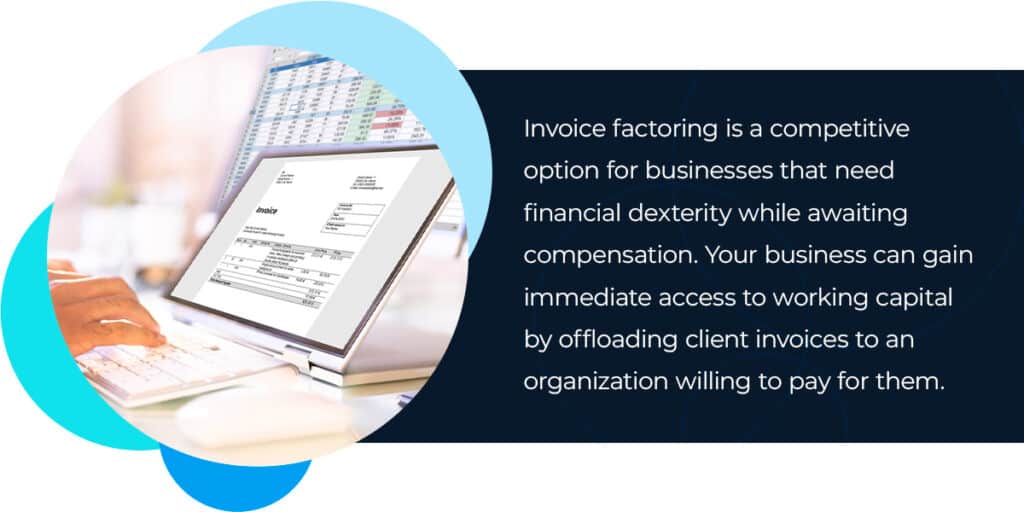Accelerate Your Business with Invoice Factoring
Invoice Factoring
Accelerate the success of your business by leveraging our Accounts Receivable Financing solution. Seamlessly convert your outstanding invoices into working capital to support your growth initiatives and achieve your business goals. Take the next step towards unlocking your business’s full potential today!
Empower Your Business with Strategic Invoice Factoring Solutions
Invoice factoring serves as a pivotal tool for established enterprises and businesses navigating seasonal fluctuations. For companies with a solid industry presence but facing challenges like delayed payments or seasonal demand variations, invoice factoring becomes a crucial stabilizing factor that ensures consistent cash flow.
More than just addressing immediate operational requirements such as payroll and infrastructure investments, invoice factoring sets the stage for sustainable growth. Whether you’re capitalizing on industry growth opportunities or preparing for seasonal peaks, invoice factoring equips you to plan ahead strategically and provides your clients with flexible repayment options.
Are you a business looking to optimize your financial strategy? Explore the tailored benefits of our invoice factoring services designed to meet your specific industry needs. Contact us today to elevate your financial approach.
Explore our range of alternative financing solutions. Discover how we can support your business objectives and facilitate growth. Find Out More.
The Power of Invoice Factoring in Modern Enterprise
Invoice factoring emerges as a quintessential financial tool, ideal for businesses spanning a myriad of sectors. From stalwart companies with decades of industry presence to dynamic startups on the cusp of expansive growth, the utility of factoring is universally acknowledged. It’s not merely about managing receivables but about harnessing an engine of financial fluidity. This approach ensures that capital is always at hand, providing businesses the leverage to navigate both routine operational costs and unexpected financial exigencies. Such immediacy in accessing funds not only bolsters working capital but also serves as a catalyst for sustained growth, ensuring that every facet of the business, from innovation to payroll, proceeds without a hitch. In an ever-evolving commercial landscape, the astuteness of adopting invoice factoring becomes paramount for enterprises aspiring for excellence and longevity.
How Does Invoice Factoring Work?
Invoice factoring is a competitive option for businesses that need financial dexterity while awaiting compensation. Your business can gain immediate access to working capital by offloading client invoices to an organization willing to pay for them. The process involves three parties — you, your client and Porter Capital — interacting over a few steps:
- Provide your product or service: Your business will fulfill its obligations to the client at the price both parties agree to.
- Send an invoice: Your accounts payable department will send a bill to the client.
- Apply for invoice factoring service: A representative from your business can submit an invoice factoring request along with relevant invoices, bank account numbers and tax information.
- Exchange the invoice with Porter Capital: Upon approval, we will collect your invoice and advance you the amount your client owes minus a small fee and a portion that we will hold until your client pays.
- Leverage working capital: Rather than waiting for payment, your company can use invoice factoring funds for any immediate or long-term expense.
- Receive the final portion of the invoice: We will return the withheld portion of the amount due when your client completes their payment.
We Empower Growth Through Invoice Factoring
Forward-thinking enterprises leverage invoice financing to catalyze immediate growth, eliminating the conventional wait of 30, 60, or even 90 days for invoice settlements. We advocate for invoice factoring as the optimal solution for businesses prioritizing swift capital inflow. By accelerating the receipt of customer payments, you sustain operations seamlessly, bypassing the constraints and prerequisites of conventional lending.

Quick Access to Cash
By advancing funds based on your receivables, we ensure rapid responses, facilitating swift approvals for both funding and factoring services.

Competitive Rates
With our invoice factoring services, we provide up to 95% value on each invoice, positioning us among the most competitively priced in the industry.

Flexible Financing
We tailor factoring solutions to fit your unique circumstances. Be it navigating past or present bankruptcy, managing swift expansion, or gearing up for growth, we’re here to support you.

Improve Cash Flow
Factoring ensures consistent cash flow, granting you prompt access to funds from outstanding invoices, thus streamlining your business operations.
Types of Business That Use Invoice Factoring
Every enterprise, irrespective of its industry, requires efficient working capital strategies to realize its objectives. Invoice factoring serves as a linchpin in streamlining your day-to-day operations. Instead of prolonged waits, secure an upfront payment for your invoices, ensuring uninterrupted business flow, even amid seasonal financial fluctuations. With immediate access to funds from your outstanding invoices, you’re empowered to allocate resources more strategically.
Tailored Financing Solutions: Types of Factoring We Offer
We proudly offer both recourse and non-recourse factoring to our clients. These are two distinct invoice factoring agreements for accounts receivable. While each provides immediate cash flow and upfront financing benefits, they differ in their foundational mechanics and backend operations.
At Porter Capital, we meticulously evaluate your unique business dynamics—considering industry benchmarks, your enterprise’s scale, and projected returns on due invoices—to recommend the most apt financing route. Our commitment is to pinpoint the optimal financing solution tailored to your distinct requirements.
Optimized Cash Flow: The Strategic Advantage of Invoice Factoring
Invoice factoring emerges as a pivotal tool for businesses eager to fortify their financial foundation while navigating the wait for customer payments. If delayed payments are a recurring challenge, or if your operations are influenced by seasonal trends, leveraging unpaid invoices provides a remedy, allowing for swift payments upfront.
Whether your capital requirements span from ensuring timely salaries, procuring state-of-the-art equipment, or fueling business expansion, invoice financing stands ready to assist. This approach not only bolsters your cash flow but also presents your clientele with adaptable repayment options.
Our commitment is efficiency. We pride ourselves on a streamlined approval process, often delivering decisions within a mere 24 hours. Our reduced documentation approach is designed to eradicate potential hassles, ensuring you have unhindered access to the resources vital for your business’s ascent. When juxtaposed with traditional financing avenues, invoice factoring unveils a spectrum of growth opportunities.

Why Porter Capital?
Porter Capital stands at the forefront, offering industry-leading invoice factoring rates coupled with an expedited approval pathway for business financing. Our expertise spans a diverse range of industries across North America, underscoring our commitment to delivering premier invoice factoring solutions. With the provision to advance up to 90% on individual invoices and ensuring the balance (after deducting our factoring fee) post customer payment, we prioritize accelerating your revenue realization.
Quick Access To Invoice Factoring
Competitive Rates
Flexible Financing Solutions
Improved Cash Flow
Incredible Customer Service
No Concentration Limits
Minimum Documentation Required
Will Fund Past-Due (Outstanding) Invoices
Trusted Business-To-Business (B2B) Factoring Company
Ready to Get Started?
Curious about the transformative potential of invoice factoring for your enterprise? Discover how Porter Capital can be your ally in obtaining pivotal business funding and financing services. Reach out via the contact form below or connect with us directly over a call.
At Porter Capital, our efficient approvals and attractive factoring rates position us as a top-tier financing solution provider. Unlock rapid cash flow, ensure consistent growth, and gain the financial agility to expand your operations with confidence.
Let’s embark on this journey. Are you set to take the next step?

Frequently Asked Questions About Invoice Factoring
Invoice Factoring Articles & Resources
How Small Business Owners Can Build and Utilize Business Credit
Learn how small business owners can build and utilize their business credit to promote growth and new opportunities.
The Numbers Behind Invoice Factoring: Key Data and Trends
This blog examines the latest industry data and provides valuable insights into the role and impact of invoice factoring across various sectors and overall utility in promoting business efficiency.
Navigating the Landscape of B2B Financing: Best Practices for Your Business
Enhance your B2B financing strategies with our best practices guide, 'Navigating the Landscape of B2B Financing'.















